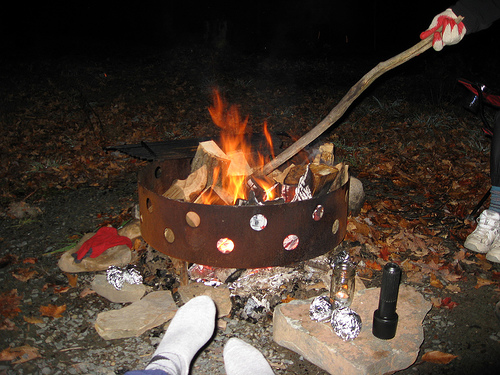
If you don’t mind the cold or lots of snow around you, camping in the winter is a wonderful way to be close to nature, build character and enjoy good times with family and friends. Despite the elements, there are some benefits to setting up camp in the cold weather, but there are some safety measures you need to implement to keep you warm, safe and healthy. Here are just a few tips to get you going. Oh, and don’t forgot to bring lots of ingredients for s’mores. That treat is a staple diet for campers.
The Value of Winter Camping
- Deepen your respect and appreciation for nature. Falling in love with a day in any other season is easy. You have fresh blooms in the Spring, warm summer days and nights and beautiful colors in the fall. Winter days can be much more demanding. However, to be in the midst of fresh powder snow and longer star-filled nights may convince you that the effort is worthwhile.
 Putting teamwork into practice. Unless you’re camping by yourself (not advisable) you will need to work as a team to set up your tents and camp, prepare meals when the ground is frozen and come to each others aid if an emergency arise.
Putting teamwork into practice. Unless you’re camping by yourself (not advisable) you will need to work as a team to set up your tents and camp, prepare meals when the ground is frozen and come to each others aid if an emergency arise.- Enjoy a quiet solitude. You won’t have to worry about summer crowds, noise or chaos in the winter. This opens the door to more chances to see the wildlfe. Make sure you have your camera in hand.
- Character building. When you learn to persevere through obstacles you are building success foundations. A successful person continues to move forward in the face of complications so the skills you learn while camping can help you in the pursuit of other life’s goals.
- Learn patience. Camping in the winter will test your resolve. It can be a very frustrating time but because you will not have a choice, you will learn to be more patient and also more tolerant of feeling discomfort. What choice is there? Stress in life is a result of our own thinking–stinking thinking, as our Pastor calls it–versus from external conditions. Once you’ve returned safely home you may feel much more confident and certainly wiser after you’ve beaten the elements.from ecome patient with discomfort.
- Develop an attitude for gratitude. It’s amazing how much we take the simplest things for granted; even life sometimes. Our indoor amenities (plumbing, central heating/air, etc.) will hold much more value in your life.
- Develop sustainable habits. After camping in a pristine environment and seeing how much waste you generated, it would be difficult not to have a consciousness about leaving only positive footprints behind. By having a more sustainable mindset you’ll be inspired to focus on way to reduce your personal imprint on the planet.

Tips for Keeping Safe and Warm
- Turn heaters off overnight. If used improperly, portable heaters can lead to carbon monoxide poisoning. Make sure you’ve read the manufacturer’s operation instructions and turn your heater off before going to sleep.
- Dress properly. Dress in layers but not too many layers that will prevent you from moving comfortably. Many sports stores like R.E.I. sell high-tech thin clothing that traps heat but allows for easy mobility. Also remember that half of your body heat can escape through an uncovered or improperly covered head so choose the right type of hat and always keep it on, even during sleep.
-

Photo: Kyle Kim Eat hearty. You may need to eat more calories than usual because your body will be burning them up to fight the cold. A bedtime snack is especially good for raising your temperature a little. Focus on complex carbohydrates that are easy to carry around and simple to prepare.
- Stay hydrated. It is easy to become dehydrated by the dry winter air so carry a thermos so that you can drink frequently. Low-sodium drinks or soups and plain water is best. Your body needs plenty of water in order to regulate its temperature and keep your blood flowing smoothly. Carry a thermos so you can drink liquids frequently.
- Make sure you have suitable geatr. Selecting the right equipment is imperative to your health and wellbeing. Research some of the winter tents that provide greater coverage and include snow stakes. Heat packs are also a good investment to keep your hands and feet warm.
- Don’t push the envelop too far. It is good to challenge yourself but don’t compromise your health and safety, or that of rescue personnel. Check the weather report and pay attention to local advisories. If you are venturing into a remote area that has limited cell phone coverage, make sure someone knows where you’re headed and when you’ll be expected back. Also, make sure you pay attention to any safety or warning signs.
Hopefully now you’re inspired to try winter camping. If you exercise caution, preparation and common sense you will be treated to a new adventure and a new sense of peace and accomplishment.

